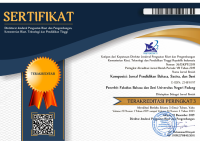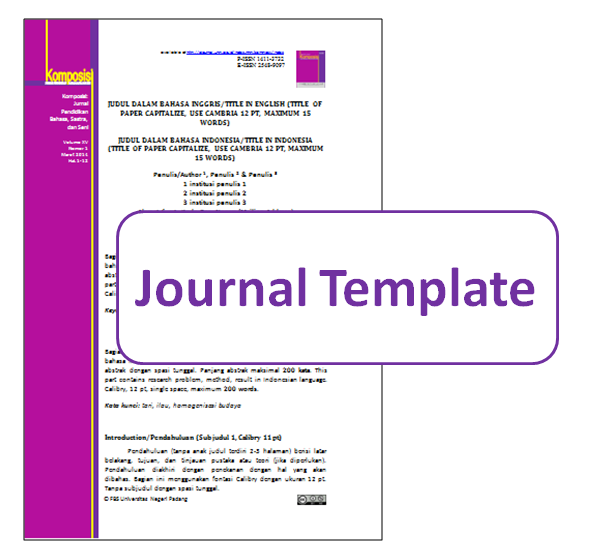Kevaliditasan Instrumen Evaluasi dalam BSE Buku Teks Bahasa Indonesia Tahun Pelajaran 2019/2020
Abstract
Keywords
Full Text:
PDFReferences
Agus Trianto, Titik Harsiati, & E. K. (2018). Bahasa Indonesia (Edisi Revi). Jakarta: Pusat Kurikulum dan Perbukuan, Balitbang, Kemendikbud.
Almanasreh, E., Moles, R., & Chen, T. F. (2018). Research in social and administrative pharmacy evaluation of methods used for estimating content validity. Research in Social and Administrative Pharmacy, (xxxx), 0–1. https://doi.org/10.1016/j.sapharm.2018.03.066
Arias, D., Chen, T. F., & Moles, R. J. (2019). Utilising a content analysis approach to assess measurement tools used in the management of general feverish illness in children. Research in Social & Administrative Pharmacy. https://doi.org/10.1016/j.sapharm.2019.10.010
Bannur, F. M., Akmar, S., Abidin, Z., & Jamil, A. (2015). A validation process of ESP testing using Weir’s socio cognitive framework (2005). Procedia - Social and Behavioral Sciences, 202(December 2014), 199–208. https://doi.org/10.1016/j.sbspro.2015.08.223
Brown, H. D. (2004). Language assessment: Principles and classroom practices. United States of America: Longman.
Clara, A., Scheuer, N., Ignacio, J., Culturales, E., Vinculado, G., Estudios, P. De, … Centro, C. S. (2020). Elementary school children â€TM s conceptions of teaching and learning to write as intentional activities. Learning and Instruction, 65(September 2019), 101249. https://doi.org/10.1016/j.learninstruc.2019.101249
Ernst, B., & Steinhauser, M. (2015). Brain and cognition effects of invalid feedback on learning and feedback-related brain activity in decision-making. Brain and Cognition, 99, 78–86. https://doi.org/10.1016/j.bandc.2015.07.006
Feistauer, D., & Richter, T. (2018). Studies in educational evaluation validity of students ’ evaluations of teaching : Biasing e ff ects of likability and prior subject interest, 59(January), 168–178. https://doi.org/10.1016/j.stueduc.2018.07.009
He, W. & X. B. (2020). Perspective-shifting are helpful for children in Chinese passive sentence comprehension. Acta Psychologica, 205. https://doi.org/https://doi.org/10.1016/j.actpsy.2020.103059
Huang, P. (2019). Learning , Culture and social interaction textbook interaction : A study of the language and cultural contextualisation of English learning textbooks. Learning, Culture and Social Interaction, 21(December 2018), 87–99. https://doi.org/10.1016/j.lcsi.2019.02.006
Johnson, Elaine B. (2002). Contextual teaching and learning: What is and why it’s here to stay. California: Corwin Press, Inc
Kementerian Pendidikan Dan Kebudayaan. Kurikulum 2013 sekolah Menengah Pertama (SMP)/ Madrasah Tsanawiyah (MTs) (2013). Jakarta.
Lee, I., Mak, P., Yuan, R. E., Chinese, T., & Kong, H. (2019). Studies in educational evaluation assessment as learning in primary writing classrooms : An exploratory study. Studies in Educational Evaluation, 62(April), 72–81. https://doi.org/10.1016/j.stueduc.2019.04.012
Mutiarazani, E., & Amroh, I. W. (2018). Kondisi buku bahasa Indonesia kelas X :, 1–13. https://doi.org/10.21776/ub.hastawiyata.2018.001.02.04
Nurgiantoro, Burhan. 2014. Penilaian pembelajaran bahasa berbasis kompetensi, Yogyakarta: BPFE Yogyakarta
Pangestika, D. N., Andayani, A., & Suhita, R. (2017). Kajian buku teks bahasa Indonesia tingkat Sekolah Menengah Pertama. BASASTRA, 5(2), 31-48.
Pop, C., & Khampirat, B. (2019). Studies in educational evaluation self-assessment instrument to measure the competencies of Namibian graduates : Testing of validity and reliability. Studies in Educational Evaluation, 60(December 2018), 130–139. https://doi.org/10.1016/j.stueduc.2018.12.004
Publishers, C. (2018). Language education & assessment then and now : Themes in language assessment Research, 1(1), 3–8.
Rahayu, M. L. (2015). Kajian instrumen penilaian pada buku teks bahasa Indonesia kelas Vii Kurikulum 2013 Terbitan Kementerian Pendidikan dan Kebudayaan (Doctoral dissertation, Universitas Pendidikan Indonesia).
Safi’i, I. (2018). Nilai-nilai pendidikan karakter dalam alat evaluasi bahasa Indonesia. Jurnal Pendidikan KarakterPendidikan, VIII(1), 74–83.
Supardi. (2015). Penilaian autentik pembelajaran afektif, kognitif, dan psikomotor. Jakarta: Rajawali Pres.
Wools, S., Eggen, T. J. H. M., & Be, A. A. (2016). Studies in educational evaluation, 48, 10–18. https://doi.org/10.1016/j.stueduc.2015.11.001
Yulianti, U. H. (2011). Analisis perbandingan kualitas buku teks BSE bahasa Indonesia untuk SMP Kelas VII Karya Ratna Susanti, Atikah Anindyarini-Sri Ningsih, dan Maryati-Sutopo: Kajian Isi, Penyajian, dan Bahasa (Doctoral dissertation, Universitas Negeri Semarang).
Yuniarti, N. & S. (2016). Validitas konstrak instrumen evaluasi outcome Lembaga Pendidikan Guru Vokasional. Jurnal Penelitian dan Evaluasi Pendidikan, 20(2), (221-233). Retrieved from http://journal.uny.ac.id/index.php/jpep
DOI: https://doi.org/10.24036/komposisi.v21i1.108716
Refbacks
- There are currently no refbacks.
Copyright (c) 2020 Komposisi: Jurnal Pendidikan Bahasa, Sastra, dan Seni

This work is licensed under a Creative Commons Attribution-NonCommercial 4.0 International License.
Komposisi: Jurnal Pendidikan Bahasa, Sastra, dan Seni, a peer-reviewed online journal in languages, literature, and arts education.
Printed ISSN 1411-3732, Online ISSN 2548-9097.
Currently, Komposisi: Jurnal Pendidikan Bahasa, Sastra, dan Seni is indexed by:
Published by:
Universitas Negeri Padang (UNP)
Address: Faculty of Languages and Arts (FBS) Universitas Negeri Padang.
Jl Prof. Dr. Hamka Air Tawar Barat, Padang - West Sumatera -Indonesia
Telp/Fax. +62751 7053363
Home page: http://ejournal.unp.ac.id/index.php/komposisi | e-mail:komposisi.fbsunp @ fbs.unp.ac.id | cc: havid_a @ fbs.unp.ac.id
slot resmi
situs toto
situs toto toto slot
Wanita Subang Beli mobil dari Nolimit city
Gatot kaca Buat TKW Jadi jutawan
Rahasia sukses bermain Mahjing wins
rahasia sukses bermain mahjong ways
div>











